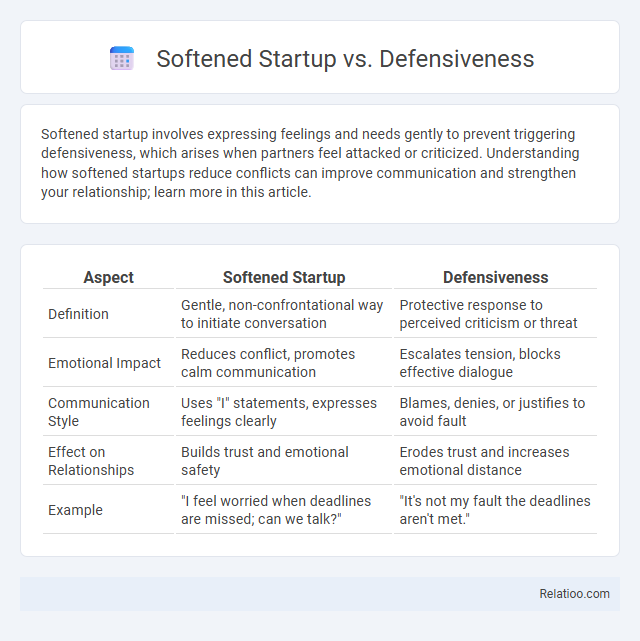Softened startup involves expressing feelings and needs gently to prevent triggering defensiveness, which arises when partners feel attacked or criticized. Understanding how softened startups reduce conflicts can improve communication and strengthen your relationship; learn more in this article.
Table of Comparison
| Aspect | Softened Startup | Defensiveness |
|---|---|---|
| Definition | Gentle, non-confrontational way to initiate conversation | Protective response to perceived criticism or threat |
| Emotional Impact | Reduces conflict, promotes calm communication | Escalates tension, blocks effective dialogue |
| Communication Style | Uses "I" statements, expresses feelings clearly | Blames, denies, or justifies to avoid fault |
| Effect on Relationships | Builds trust and emotional safety | Erodes trust and increases emotional distance |
| Example | "I feel worried when deadlines are missed; can we talk?" | "It's not my fault the deadlines aren't met." |
Understanding the Softened Startup Approach
The softened startup approach involves beginning conversations gently by expressing feelings and needs without blame, promoting openness and reducing conflict. Unlike defensiveness, which triggers protective responses and blocks communication, the softened startup fosters empathy and collaborative problem-solving. Mastering this technique in interpersonal communication enhances relationship satisfaction and long-term conflict resolution.
Defining Defensiveness in Communication
Defensiveness in communication refers to a protective response triggered by perceived criticism or threats, often characterized by denial, counterattacks, or withdrawal, which hinders effective dialogue. Recognizing defensiveness involves identifying verbal cues such as blaming or avoiding responsibility, contrasting with softened startups that employ gentle, non-accusatory language to initiate conversations. Employing softened startups reduces defensiveness by fostering a safe, collaborative environment that encourages openness and resolution.
The Psychology Behind Softened Startup
The psychology behind softened startup centers on expressing complaints gently to avoid triggering defensiveness, a key element in effective communication and conflict resolution. Research in relationship psychology shows that softened startup reduces emotional escalation by using kind, non-accusatory language, which fosters empathy and openness. This approach contrasts sharply with defensiveness, where individuals respond with self-protection tactics, further escalating conflict and hindering constructive dialogue.
Key Indicators of Defensiveness
Key indicators of defensiveness include raised voice, interrupting, blaming, and denying responsibility during conflicts. Softened startup techniques reduce defensiveness by using gentle, non-accusatory language and expressing feelings without judgment. Recognizing defensiveness helps maintain constructive communication and prevents escalation in relational disputes.
Benefits of Using a Softened Startup
Using a softened startup during conflict resolution significantly reduces defensiveness by gently expressing concerns without blame, fostering a more open and constructive dialogue. Your communication becomes more effective as softened startups create a safe emotional environment, encouraging cooperation and mutual understanding. This approach leads to healthier relationships and quicker problem-solving by minimizing negative reactions and promoting empathy.
Negative Impacts of Defensiveness in Conversations
Defensiveness in conversations triggers resistance and blocks open communication, undermining trust and collaboration between participants. Your ability to resolve conflicts diminishes as defensiveness leads to misunderstandings, increased tension, and emotional escalation. A softened startup, by contrast, promotes a calm and respectful tone that reduces negative impacts and fosters productive dialogue.
Practical Strategies for Implementing Softened Startup
Softened startup involves approaching sensitive topics with gentle, non-accusatory language to reduce defensiveness, enhancing productive communication in relationships. Practical strategies include using "I" statements to express feelings without blaming, maintaining a calm tone of voice, and starting conversations with positive affirmations to create a safe environment for dialogue. By implementing these techniques, you can foster openness and minimize defensive reactions, improving conflict resolution effectively.
Overcoming Defensiveness in Relationships
Softened startup is a communication technique that involves beginning conversations gently and with positive intent, which helps reduce defensiveness in relationships by creating a safe emotional environment. When you use softened startup, your partner is less likely to react with defensiveness, allowing for more productive and empathetic dialogue. Overcoming defensiveness hinges on recognizing triggers and responding with softness, reducing conflict and fostering deeper understanding between partners.
Real-Life Examples: Softened Startup vs Defensiveness
In real-life conversations, a softened startup involves expressing concerns peacefully, such as saying, "I felt hurt when you forgot our anniversary," which reduces defensiveness and invites empathy. Defensiveness often arises when one responds with blame or excuses, like "It's not my fault; you never remind me," escalating conflicts and hindering resolution. Using a softened startup fosters open communication and problem-solving, while defensiveness typically blocks understanding and prolongs disputes.
Building Healthier Connections Through Communication Techniques
Softened startup involves beginning conversations gently to reduce defensiveness and foster open dialogue, which is crucial for building healthier connections. Defensiveness often triggers negative communication cycles, but recognizing and responding to softened startups encourages empathy and mutual understanding. Employing softened startup techniques strengthens relational bonds by promoting calm, respectful exchanges that prevent escalation and nurture emotional safety.

Infographic: Softened Startup vs Defensiveness
 relatioo.com
relatioo.com